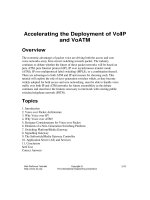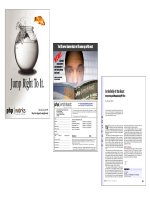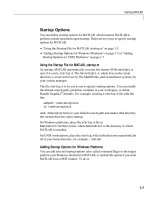Tài liệu For the Term of His Natural Life pdf
Bạn đang xem bản rút gọn của tài liệu. Xem và tải ngay bản đầy đủ của tài liệu tại đây (2.24 MB, 723 trang )
Download free eBooks of classic literature, books and
novels at Planet eBook. Subscribe to our free eBooks blog
and email newsletter.
For the Term of
His Natural Life
By Marcus Clarke
F T H N L
DEDICATION
TO
SIR CHARLES GAVAN DUFFY
M
y Dear Sir Charles, I take leave to dedicate this work
to you, not merely because your nineteen years of po-
litical and literary life in Australia render it very tting that
any work written by a resident in the colonies, and having to
do with the history of past colonial days, should bear your
name upon its dedicatory page; but because the publication
of my book is due to your advice and encouragement.
e convict of ction has been hitherto shown only at
the beginning or at the end of his career. Either his exile has
been the mysterious end to his misdeeds, or he has appeared
upon the scene to claim interest by reason of an equally un-
intelligible love of crime acquired during his experience in
a penal settlement. Charles Reade has drawn the interior
of a house of correction in England, and Victor Hugo has
shown how a French convict fares aer the fullment of his
sentence. But no writer—so far as I am aware—has attempt-
ed to depict the dismal condition of a felon during his term
of transportation.
I have endeavoured in ‘His Natural Life’ to set forth the
working and the results of an English system of transpor-
tation carefully considered and carried out under ocial
supervision; and to illustrate in the manner best calculated,
as I think, to attract general attention, the inexpediency of
again allowing oenders against the law to be herded to-
F B P B.
gether in places remote from the wholesome inuence of
public opinion, and to be submitted to a discipline which
must necessarily depend for its just administration upon
the personal character and temper of their gaolers.
Your critical faculty will doubtless nd, in the construc-
tion and artistic working of this book, many faults. I do not
think, however, that you will discover any exaggerations.
Some of the events narrated are doubtless tragic and ter-
rible; but I hold it needful to my purpose to record them, for
they are events which have actually occurred, and which,
if the blunders which produced them be repeated, must
infallibly occur again. It is true that the British Govern-
ment have ceased to deport the criminals of England, but
the method of punishment, of which that deportation was
a part, is still in existence. Port Blair is a Port Arthur lled
with Indian-men instead of Englishmen; and, within the
last year, France has established, at New Caledonia, a pe-
nal settlement which will, in the natural course of things,
repeat in its annals the history of Macquarie Harbour and
of Norfolk Island.
With this brief preface I beg you to accept this work. I
would that its merits were equal either to your kindness or
to my regard.
I am,
My dear Sir Charles,
Faithfully yours,
MARCUS CLARKE
THE PUBLIC LIBRARY, MELBOURNE
F T H N L
PROLOGUE
O
n the evening of May 3, 1827, the garden of a large
red-brick bow-windowed mansion called North End
House, which, enclosed in spacious grounds, stands on
the eastern height of Hampstead Heath, between Finchley
Road and the Chestnut Avenue, was the scene of a domes-
tic tragedy.
ree persons were the actors in it. One was an old man,
whose white hair and wrinkled face gave token that he was
at least sixty years of age. He stood erect with his back to
the wall, which separates the garden from the Heath, in the
attitude of one surprised into sudden passion, and held up-
lied the heavy ebony cane upon which he was ordinarily
accustomed to lean. He was confronted by a man of two-
and-twenty, unusually tall and athletic of gure, dresses in
rough seafaring clothes, and who held in his arms, protect-
ing her, a lady of middle age. e face of the young man
wore an expression of horror-stricken astonishment, and
the slight frame of the grey-haired woman was convulsed
with sobs.
ese three people were Sir Richard Devine, his wife,
and his only son Richard, who had returned from abroad
that morning.
‘So, madam,’ said Sir Richard, in the high-strung accents
which in crises of great mental agony are common to the
F B P B.
most self-restrained of us, ‘you have been for twenty years
a living lie! For twenty years you have cheated and mocked
me. For twenty years—in company with a scoundrel whose
name is a byword for all that is proigate and base—you
have laughed at me for a credulous and hood-winked fool;
and now, because I dared to raise my hand to that reckless
boy, you confess your shame, and glory in the confession!’
‘Mother, dear mother!’ cried the young man, in a parox-
ysm of grief, ‘say that you did not mean those words; you
said them but in anger! See, I am calm now, and he may
strike me if he will.’
Lady Devine shuddered, creeping close, as though to
hide herself in the broad bosom of her son.
e old man continued: ‘I married you, Ellinor Wade, for
your beauty; you married me for my fortune. I was a plebe-
ian, a ship’s carpenter; you were well born, your father was a
man of fashion, a gambler, the friend of rakes and prodigals.
I was rich. I had been knighted. I was in favour at Court. He
wanted money, and he sold you. I paid the price he asked,
but there was nothing of your cousin, my Lord Bellasis and
Wotton, in the bond.’
‘Spare me, sir, spare me!’ said Lady Ellinor faintly.
‘Spare you! Ay, you have spared me, have you not? Look
ye,’ he cried, in sudden fury, ‘I am not to be fooled so easily.
Your family are proud. Colonel Wade has other daughters.
Your lover, my Lord Bellasis, even now, thinks to retrieve
his broken fortunes by marriage. You have confessed your
shame. To-morrow your father, your sisters, all the world,
shall know the story you have told me!’
F T H N L
‘By Heaven, sir, you will not do this!’ burst out the young
man.
‘Silence, bastard!’ cried Sir Richard. ‘Ay, bite your lips;
the word is of your precious mother’s making!’
Lady Devine slipped through her son’s arms and fell on
her knees at her husband’s feet.
‘Do not do this, Richard. I have been faithful to you for
two-and-twenty years. I have borne all the slights and in-
sults you have heaped upon me. e shameful secret of my
early love broke from me when in your rage, you threatened
him. Let me go away; kill me; but do not shame me.’
Sir Richard, who had turned to walk away, stopped sud-
denly, and his great white eyebrows came together in his
red face with a savage scowl. He laughed, and in that laugh
his fury seemed to congeal into a cold and cruel hate.
‘You would preserve your good name then. You would
conceal this disgrace from the world. You shall have your
wish—upon one condition.’
‘What is it, sir?’ she asked, rising, but trembling with ter-
ror, as she stood with drooping arms and widely opened
eyes.
e old man looked at her for an instant, and then said
slowly, ‘at this impostor, who so long has falsely borne
my name, has wrongfully squandered my money, and un-
lawfully eaten my bread, shall pack! at he abandon for
ever the name he has usurped, keep himself from my sight,
and never set foot again in house of mine.’
‘You would not part me from my only son!’ cried the
wretched woman.
F B P B.
‘Take him with you to his father then.’
Richard Devine gently loosed the arms that again clung
around his neck, kissed the pale face, and turned his own—
scarcely less pale—towards the old man.
‘I owe you no duty,’ he said. ‘You have always hated and
reviled me. When by your violence you drove me from your
house, you set spies to watch me in the life I had chosen. I
have nothing in common with you. I have long felt it. Now
when I learn for the rst time whose son I really am, I re-
joice to think that I have less to thank you for than I once
believed. I accept the terms you oer. I will go. Nay, mother,
think of your good name.’
Sir Richard Devine laughed again. ‘I am glad to see you
are so well disposed. Listen now. To-night I send for Quaid
to alter my will. My sister’s son, Maurice Frere, shall be my
heir in your stead. I give you nothing. You leave this house
in an hour. You change your name; you never by word or
deed make claim on me or mine. No matter what strait
or poverty you plead—if even your life should hang upon
the issue—the instant I hear that there exists on earth one
who calls himself Richard Devine, that instant shall your
mother’s shame become a public scandal. You know me. I
keep my word. I return in an hour, madam; let me nd him
gone.’
He passed them, upright, as if upborne by passion, strode
down the garden with the vigour that anger lends, and took
the road to London.
‘Richard!’ cried the poor mother. ‘Forgive me, my son! I
have ruined you.’
F T H N L
Richard Devine tossed his black hair from his brow in
sudden passion of love and grief.
‘Mother, dear mother, do not weep,’ he said. ‘I am not
worthy of your tears. Forgive! It is I—impetuous and un-
grateful during all your years of sorrow—who most need
forgiveness. Let me share your burden that I may lighten it.
He is just. It is tting that I go. I can earn a name—a name
that I need not blush to bear nor you to hear. I am strong. I
can work. e world is wide. Farewell! my own mother!’
‘Not yet, not yet! Ah! see he has taken the Belsize Road.
Oh, Richard, pray Heaven they may not meet.’
‘Tush! ey will not meet! You are pale, you faint!’
‘A terror of I know not what coming evil overpowers me.
I tremble for the future. Oh, Richard, Richard! Forgive me!
Pray for me.’
‘Hush, dearest! Come, let me lead you in. I will write. I
will send you news of me once at least, ere I depart. So—you
are calmer, mother!’
* * * * * *
Sir Richard Devine, knight, shipbuilder, naval contractor,
and millionaire, was the son of a Harwich boat carpen-
ter. Early le an orphan with a sister to support, he soon
reduced his sole aim in life to the accumulation of mon-
ey. In the Harwich boat-shed, nearly y years before, he
had contracted—in deance of prophesied failure—to build
the Hastings sloop of war for His Majesty King George
the ird’s Lords of the Admiralty. is contract was the
thin end of that wedge which eventually split the mighty
oak block of Government patronage into three-deckers
F B P B.
and ships of the line; which did good service under Pellew,
Parker, Nelson, Hood; which exfoliated and ramied into
huge dockyards at Plymouth, Portsmouth, and Sheerness,
and bore, as its buds and owers, countless barrels of mea-
sly pork and maggoty biscuit. e sole aim of the coarse,
pushing and hard-headed son of Dick Devine was to make
money. He had cringed and crawled and uttered and blus-
tered, had licked the dust o great men’s shoes, and danced
attendance in great men’s ante-chambers. Nothing was too
low, nothing too high for him. A shrewd man of business, a
thorough master of his trade, troubled with no scruples of
honour or of delicacy, he made money rapidly, and saved
it when made. e rst hint that the public received of his
wealth was in 1796, when Mr. Devine, one of the ship-
wrights to the Government, and a comparatively young
man of forty-four or thereabouts, subscribed ve thou-
sand pounds to the Loyalty Loan raised to prosecute the
French war. In 1805, aer doing good, and it was hinted not
unprotable, service in the trial of Lord Melville, the Trea-
surer of the Navy, he married his sister to a wealthy Bristol
merchant, one Anthony Frere, and married himself to El-
linor Wade, the eldest daughter of Colonel Wotton Wade,
a boon companion of the Regent, and uncle by marriage of
a remarkable scamp and dandy, Lord Bellasis. At that time,
what with lucky speculations in the Funds—assisted, it was
whispered, by secret intelligence from France during the
stormy years of ‘13, ‘14, and ‘15—and the legitimate prot
on his Government contracts, he had accumulated a prince-
ly fortune, and could aord to live in princely magnicence.
F T H N L
But the old-man-of-the-sea burden of parsimony and ava-
rice which he had voluntarily taken upon him was not to
be shaken o, and the only show he made of his wealth was
by purchasing, on his knighthood, the rambling but com-
fortable house at Hampstead, and ostensibly retiring from
active business.
His retirement was not a happy one. He was a stern fa-
ther and a severe master. His servants hated, and his wife
feared him. His only son Richard appeared to inherit his
father’s strong will and imperious manner. Under careful
supervision and a just rule he might have been guided to
good; but le to his own devices outside, and galled by the
iron yoke of parental discipline at home, he became reck-
less and prodigal. e mother—poor, timid Ellinor, who
had been rudely torn from the love of her youth, her cous-
in, Lord Bellasis—tried to restrain him, but the head-strong
boy, though owning for his mother that strong love which is
oen a part of such violent natures, proved intractable, and
aer three years of parental feud, he went o to the Conti-
nent, to pursue there the same reckless life which in London
had oended Sir Richard. Sir Richard, upon this, sent for
Maurice Frere, his sister’s son—the abolition of the slave
trade had ruined the Bristol House of Frere—and bought for
him a commission in a marching regiment, hinting dark-
ly of special favours to come. His open preference for his
nephew had galled to the quick his sensitive wife, who con-
trasted with some heart-pangs the gallant prodigality of her
father with the niggardly economy of her husband. Between
the houses of parvenu Devine and long-descended Wotton
F B P B.
Wade there had long been little love. Sir Richard felt that the
colonel despised him for a city knight, and had heard that
over claret and cards Lord Bellasis and his friends had oen
lamented the hard fortune which gave the beauty, Ellinor,
to so sordid a bridegroom. Armigell Esme Wade, Viscount
Bellasis and Wotton, was a product of his time. Of good
family (his ancestor, Armigell, was reputed to have land-
ed in America before Gilbert or Raleigh), he had inherited
his manor of Bellasis, or Belsize, from one Sir Esme Wade,
ambassador from Queen Elizabeth to the King of Spain in
the delicate matter of Mendoza, and aerwards counsellor
to James I, and Lieutenant of the Tower. is Esme was a
man of dark devices. It was he who negotiated with Mary
Stuart for Elizabeth; it was he who wormed out of Cobham
the evidence against the great Raleigh. He became rich, and
his sister (the widow of Henry de Kirkhaven, Lord of Hem-
eet) marrying into the family of the Wottons, the wealth of
the house was further increased by the union of her daugh-
ter Sybil with Marmaduke Wade. Marmaduke Wade was a
Lord of the Admiralty, and a patron of Pepys, who in his di-
ary [July 17,1668] speaks of visiting him at Belsize. He was
raised to the peerage in 1667 by the title of Baron Bellasis
and Wotton, and married for his second wife Anne, daugh-
ter of Philip Stanhope, second Earl of Chestereld. Allied to
this powerful house, the family tree of Wotton Wade grew
and ourished.
In 1784, Philip, third Baron, married the celebrated
beauty, Miss Povey, and had issue Armigell Esme, in whose
person the family prudence seemed to have run itself out.
F T H N L
e fourth Lord Bellasis combined the daring of Armi-
gell, the adventurer, with the evil disposition of Esme, the
Lieutenant of the Tower. No sooner had he become master
of his fortune than he took to dice, drink, and debauch-
ery with all the extravagance of the last century. He was
foremost in every riot, most notorious of all the notorious
‘bloods’ of the day.
Horace Walpole, in one of his letters to Selwyn in 1785,
mentions a fact which may stand for a page of narrative.
‘Young Wade,’ he says, ‘is reported to have lost one thousand
guineas last night to that vulgarest of all the Bourbons, the
Duc de Chartres, and they say the fool is not yet nineteen.’
From a pigeon Armigell Wade became a hawk, and at thirty
years of age, having lost together with his estates all chance
of winning the one woman who might have saved him—his
cousin Ellinor—he became that most unhappy of all beings,
a well-born blackleg. When he was told by thin-lipped, cool
Colonel Wade that the rich shipbuilder, Sir Richard Devine,
had proposed an alliance with fair-haired gentle Ellinor, he
swore, with erce knitting of his black brows, that no law of
man nor Heaven should further restrain him in his selsh
prodigality. ‘You have sold your daughter and ruined me,’
he said; ‘look to the consequences.’ Colonel Wade sneered
at his ery kinsman: ‘You will nd Sir Richard’s house a
pleasant one to visit, Armigell; and he should be worth an
income to so experienced a gambler as yourself.’ Lord Bel-
lasis did visit at Sir Richard’s house during the rst year of
his cousin’s marriage; but upon the birth of the son who
is the hero of this history, he aected a quarrel with the
F B P B.
city knight, and cursing him to the Prince and Poins for
a miserly curmudgeon, who neither diced nor drank like
a gentleman, departed, more desperately at war with for-
tune than ever, for his old haunts. e year 1827 found him
a hardened, hopeless old man of sixty, battered in health
and ruined in pocket; but who, by dint of stays, hair-dye,
and courage, yet faced the world with undaunted front, and
dined as gaily in baili-haunted Belsize as he had dined at
Carlton House. Of the possessions of the House of Wotton
Wade, this old manor, timberless and bare, was all that re-
mained, and its master rarely visited it.
On the evening of May 3, 1827, Lord Bellasis had been
attending a pigeon match at Hornsey Wood, and having
resisted the importunities of his companion, Mr. Lionel
Croon (a young gentleman-rake, whose position in the
sporting world was not the most secure), who wanted him
to go on into town, he had avowed his intention of striking
across Hampstead to Belsize. ‘I have an appointment at the
r trees on the Heath,’ he said.
‘With a woman?’ asked Mr. Croon.
‘Not at all; with a parson.’
‘A parson!’
‘You stare! Well, he is only just ordained. I met him last
year at Bath on his vacation from Cambridge, and he was
good enough to lose some money to me.’
‘And now waits to pay it out of his rst curacy. I wish your
lordship joy with all my soul. en, we must push on, for it
grows late.’
‘anks, my dear sir, for the ‘we,’ but I must go alone,’
F T H N L
said Lord Bellasis dryly. ‘To-morrow you can settle with me
for the sitting of last week. Hark! the clock is striking nine.
Good night.’
* * * * * *
At half-past nine Richard Devine quitted his mother’s
house to begin the new life he had chosen, and so, drawn
together by that strange fate of circumstances which creates
events, the father and son approached each other.
* * * * * *
As the young man gained the middle of the path which
led to the Heath, he met Sir Richard returning from the vil-
lage. It was no part of his plan to seek an interview with
the man whom his mother had so deeply wronged, and he
would have slunk past in the gloom; but seeing him thus
alone returning to a desolated home, the prodigal was
tempted to utter some words of farewell and of regret. To
his astonishment, however, Sir Richard passed swily on,
with body bent forward as one in the act of falling, and with
eyes unconscious of surroundings, staring straight into the
distance. Half-terried at this strange appearance, Richard
hurried onward, and at a turn of the path stumbled upon
something which horribly accounted for the curious action
of the old man. A dead body lay upon its face in the heather;
beside it was a heavy riding whip stained at the handle with
blood, and an open pocket-book. Richard took up the book,
and read, in gold letters on the cover, ‘Lord Bellasis.’
e unhappy young man knelt down beside the body
and raised it. e skull had been fractured by a blow, but
it seemed that life yet lingered. Overcome with horror—for
F B P B.
he could not doubt but that his mother’s worst fears had
been realized—Richard knelt there holding his murdered
father in his arms, waiting until the murderer, whose name
he bore, should have placed himself beyond pursuit. It
seemed an hour to his excited fancy before he saw a light
pass along the front of the house he had quitted, and knew
that Sir Richard had safely reached his chamber. With some
bewildered intention of summoning aid, he le the body
and made towards the town. As he stepped out on the path
he heard voices, and presently some dozen men, one of
whom held a horse, burst out upon him, and, with sudden
fury, seized and ung him to the ground.
At rst the young man, so rudely assailed, did not com-
prehend his own danger. His mind, bent upon one hideous
explanation of the crime, did not see another obvious one
which had already occurred to the mind of the landlord of
the ree Spaniards.
‘God defend me!’ cried Mr. Mogford, scanning by the
pale light of the rising moon the features of the murdered
man, ‘but it is Lord Bellasis!—oh, you bloody villain! Jem,
bring him along here, p’r’aps his lordship can recognize
him!’
‘It was not I!’ cried Richard Devine. ‘For God’s sake, my
lord say—’ then he stopped abruptly, and being forced on
his knees by his captors, remained staring at the dying man,
in sudden and ghastly fear.
ose men in whom emotion has the eect of quickening
circulation of the blood reason rapidly in moments of dan-
ger, and in the terrible instant when his eyes met those of
F T H N L
Lord Bellasis, Richard Devine had summed up the chances
of his future fortune, and realized to the full his personal
peril. e runaway horse had given the alarm. e drinkers
at the Spaniards’ Inn had started to search the Heath, and
had discovered a fellow in rough costume, whose person
was unknown to them, hastily quitting a spot where, beside
a ried pocket-book and a blood-stained whip, lay a dying
man.
e web of circumstantial evidence had enmeshed him.
An hour ago escape would have been easy. He would have
had but to cry, ‘I am the son of Sir Richard Devine. Come
with me to yonder house, and I will prove to you that I have
but just quitted it,’—to place his innocence beyond imme-
diate question. at course of action was impossible now.
Knowing Sir Richard as he did, and believing, moreover,
that in his raging passion the old man had himself met and
murdered the destroyer of his honour, the son of Lord Bella-
sis and Lady Devine saw himself in a position which would
compel him either to sacrice himself, or to purchase a
chance of safety at the price of his mother’s dishonour and
the death of the man whom his mother had deceived. If the
outcast son were brought a prisoner to North End House,
Sir Richard—now doubly oppressed of fate—would be
certain to deny him; and he would be compelled, in self-
defence, to reveal a story which would at once bring his
mother to open infamy, and send to the gallows the man
who had been for twenty years deceived—the man to whose
kindness he owed education and former fortune. He knelt,
stupeed, unable to speak or move.
F B P B.
‘Come,’ cried Mogford again; ‘say, my lord, is this the vil-
lain?’
Lord Bellasis rallied his failing senses, his glazing eyes
stared into his son’s face with horrible eagerness; he shook
his head, raised a feeble arm as though to point elsewhere,
and fell back dead.
‘If you didn’t murder him, you robbed him,’ growled
Mogford, ‘and you shall sleep at Bow Street to-night. Tom,
run on to meet the patrol, and leave word at the Gate-house
that I’ve a passenger for the coach!—Bring him on, Jack!—
What’s your name, eh?’
He repeated the rough question twice before his prisoner
answered, but at length Richard Devine raised a pale face
which stern resolution had already hardened into deant
manhood, and said ‘Dawes—Rufus Dawes.’
* * * * * *
His new life had begun already: for that night one, Ru-
fus Dawes, charged with murder and robbery, lay awake in
prison, waiting for the fortune of the morrow.
Two other men waited as eagerly. One, Mr. Lionel Crof-
ton; the other, the horseman who had appointment with the
murdered Lord Bellasis under the shadow of the r trees on
Hampstead Heath. As for Sir Richard Devine, he waited for
no one, for upon reaching his room he had fallen senseless
in a t of apoplexy.
F T H N L
BOOK I.—THE SEA. 1827.
F B P B.
CHAPTER I. THE
PRISON SHIP.
I
n the breathless stillness of a tropical aernoon, when the
air was hot and heavy, and the sky brazen and cloudless,
the shadow of the Malabar lay solitary on the surface of the
glittering sea.
e sun—who rose on the le hand every morning a
blazing ball, to move slowly through the unbearable blue,
until he sank ery red in mingling glories of sky and ocean
on the right hand—had just got low enough to peep be-
neath the awning that covered the poop-deck, and awaken
a young man, in an undress military uniform, who was
dozing on a coil of rope.
‘Hang it!’ said he, rising and stretching himself, with the
weary sigh of a man who has nothing to do, ‘I must have
been asleep”; and then, holding by a stay, he turned about
and looked down into the waist of the ship.
Save for the man at the wheel and the guard at the quar-
ter-railing, he was alone on the deck. A few birds ew round
about the vessel, and seemed to pass under her stern win-
dows only to appear again at her bows. A lazy albatross,
with the white water ashing from his wings, rose with a
dabbling sound to leeward, and in the place where he had
been glided the hideous n of a silently-swimming shark.
F T H N L
e seams of the well-scrubbed deck were sticky with melt-
ed pitch, and the brass plate of the compass-case sparkled in
the sun like a jewel. ere was no breeze, and as the clumsy
ship rolled and lurched on the heaving sea, her idle sails
apped against her masts with a regularly recurring noise,
and her bowsprit would seem to rise higher with the water’s
swell, to dip again with a jerk that made each rope tremble
and tauten. On the forecastle, some half-dozen soldiers, in
all varieties of undress, were playing at cards, smoking, or
watching the shing-lines hanging over the catheads.
So far the appearance of the vessel diered in no wise
from that of an ordinary transport. But in the waist a curi-
ous sight presented itself. It was as though one had built a
cattle-pen there. At the foot of the foremast, and at the quar-
ter-deck, a strong barricade, loop-holed and furnished with
doors for ingress and egress, ran across the deck from bul-
wark to bulwark. Outside this cattle-pen an armed sentry
stood on guard; inside, standing, sitting, or walking mo-
notonously, within range of the shining barrels in the arm
chest on the poop, were some sixty men and boys, dressed
in uniform grey. e men and boys were prisoners of the
Crown, and the cattle-pen was their exercise ground. eir
prison was down the main hatchway, on the ‘tween decks,
and the barricade, continued down, made its side walls.
It was the fag end of the two hours’ exercise graciously
permitted each aernoon by His Majesty King George the
Fourth to prisoners of the Crown, and the prisoners of the
Crown were enjoying themselves. It was not, perhaps, so
pleasant as under the awning on the poop-deck, but that
F B P B.
sacred shade was only for such great men as the captain and
his ocers, Surgeon Pine, Lieutenant Maurice Frere, and,
most important personages of all, Captain Vickers and his
wife.
at the convict leaning against the bulwarks would like
to have been able to get rid of his enemy the sun for a mo-
ment, was probable enough. His companions, sitting on the
combings of the main-hatch, or crouched in careless fash-
ion on the shady side of the barricade, were laughing and
talking, with blasphemous and obscene merriment hideous
to contemplate; but he, with cap pulled over his brows, and
hands thrust into the pockets of his coarse grey garments,
held aloof from their dismal joviality.
e sun poured his hottest rays on his head unheeded,
and though every cranny and seam in the deck sweltered
hot pitch under the erce heat, the man stood there, mo-
tionless and morose, staring at the sleepy sea. He had stood
thus, in one place or another, ever since the groaning vessel
had escaped from the rollers of the Bay of Biscay, and the
miserable hundred and eighty creatures among whom he
was classed had been freed from their irons, and allowed to
sni fresh air twice a day.
e low-browed, coarse-featured ruans grouped about
the deck cast many a leer of contempt at the solitary g-
ure, but their remarks were conned to gestures only. ere
are degrees in crime, and Rufus Dawes, the convicted felon,
who had but escaped the gallows to toil for all his life in
irons, was a man of mark. He had been tried for the rob-
bery and murder of Lord Bellasis. e friendless vagabond’s
F T H N L
lame story of nding on the Heath a dying man would not
have availed him, but for the curious fact sworn to by the
landlord of the Spaniards’ Inn, that the murdered noble-
man had shaken his head when asked if the prisoner was
his assassin. e vagabond was acquitted of the murder, but
condemned to death for the robbery, and London, who took
some interest in the trial, considered him fortunate when
his sentence was commuted to transportation for life.
It was customary on board these oating prisons to keep
each man’s crime a secret from his fellows, so that if he
chose, and the caprice of his gaolers allowed him, he could
lead a new life in his adopted home, without being taunted
with his former misdeeds. But, like other excellent devices,
the expedient was only a nominal one, and few out of the
doomed hundred and eighty were ignorant of the oence
which their companions had committed. e more guilty
boasted of their superiority in vice; the petty criminals
swore that their guilt was blacker than it appeared. More-
over, a deed so bloodthirsty and a respite so unexpected,
had invested the name of Rufus Dawes with a grim distinc-
tion, which his superior mental abilities, no less than his
haughty temper and powerful frame, combined to support.
A young man of two-and-twenty owning to no friends, and
existing among them but by the fact of his criminality, he
was respected and admired. e vilest of all the vile horde
penned between decks, if they laughed at his ‘ne airs’ be-
hind his back, cringed and submitted when they met him
face to face—for in a convict ship the greatest villain is the
greatest hero, and the only nobility acknowledged by that
F B P B.
hideous commonwealth is that Order of the Halter which is
conferred by the hand of the hangman.
e young man on the poop caught sight of the tall g-
ure leaning against the bulwarks, and it gave him an excuse
to break the monotony of his employment.
‘Here, you!’ he called with an oath, ‘get out of the gang-
way! ‘Rufus Dawes was not in the gangway—was, in fact, a
good two feet from it, but at the sound of Lieutenant Frere’s
voice he started, and went obediently towards the hatch-
way.
‘Touch your hat, you dog!’ cries Frere, coming to the
quarter-railing. ‘Touch your damned hat! Do you hear?’
Rufus Dawes touched his cap, saluting in half military
fashion. ‘I’ll make some of you fellows smart, if you don’t
have a care,’ went on the angry Frere, half to himself. ‘Inso-
lent blackguards!’
And then the noise of the sentry, on the quarter-deck
below him, grounding arms, turned the current of his
thoughts. A thin, tall, soldier-like man, with a cold blue
eye, and prim features, came out of the cuddy below, hand-
ing out a fair-haired, aected, mincing lady, of middle age.
Captain Vickers, of Mr. Frere’s regiment, ordered for ser-
vice in Van Diemen’s Land, was bringing his lady on deck
to get an appetite for dinner.
Mrs. Vickers was forty-two (she owned to thirty-three),
and had been a garrison-belle for eleven weary years be-
fore she married prim John Vickers. e marriage was not
a happy one. Vickers found his wife extravagant, vain, and
snappish, and she found him harsh, disenchanted, and
F T H N L
commonplace. A daughter, born two years aer their mar-
riage, was the only link that bound the ill-assorted pair.
Vickers idolized little Sylvia, and when the recommenda-
tion of a long sea-voyage for his failing health induced him
to exchange into the —th, he insisted upon bringing the
child with him, despite Mrs. Vickers’s reiterated objections
on the score of educational diculties. ‘He could educate
her himself, if need be,’ he said; ‘and she should not stay at
home.’
So Mrs. Vickers, aer a hard struggle, gave up the point
and her dreams of Bath together, and followed her husband
with the best grace she could muster. When fairly out to
sea she seemed reconciled to her fate, and employed the
intervals between scolding her daughter and her maid, in
fascinating the boorish young Lieutenant, Maurice Frere.
Fascination was an integral portion of Julia Vickers’s
nature; admiration was all she lived for: and even in a con-
vict ship, with her husband at her elbow, she must irt, or
perish of mental inanition. ere was no harm in the crea-
ture. She was simply a vain, middle-aged woman, and Frere
took her attentions for what they were worth. Moreover, her
good feeling towards him was useful, for reasons which will
shortly appear.
Running down the ladder, cap in hand, he oered her
his assistance.
‘ank you, Mr. Frere. ese horrid ladders. I really—he,
he—quite tremble at them. Hot! Yes, dear me, most oppres-
sive. John, the camp-stool. Pray, Mr. Frere—oh, thank you!
Sylvia! Sylvia! John, have you my smelling salts? Still a calm,
F B P B.
I suppose? ese dreadful calms!’
is semi-fashionable slip-slop, within twenty yards
of the wild beasts’ den, on the other side of the barricade,
sounded strange; but Mr. Frere thought nothing of it. Fa-
miliarity destroys terror, and the incurable irt, uttered
her muslins, and played o her second-rate graces, under
the noses of the grinning convicts, with as much compla-
cency as if she had been in a Chatham ball-room. Indeed, if
there had been nobody else near, it is not unlikely that she
would have disdainfully fascinated the ‘tween-decks, and
made eyes at the most presentable of the convicts there.
Vickers, with a bow to Frere, saw his wife up the ladder,
and then turned for his daughter.
She was a delicate-looking child of six years old, with
blue eyes and bright hair. ough indulged by her father,
and spoiled by her mother, the natural sweetness of her dis-
position saved her from being disagreeable, and the eects
of her education as yet only showed themselves in a thou-
sand imperious prettinesses, which made her the darling of
the ship. Little Miss Sylvia was privileged to go anywhere
and do anything, and even convictism shut its foul mouth
in her presence. Running to her father’s side, the child chat-
tered with all the volubility of attered self-esteem. She
ran hither and thither, asked questions, invented answers,
laughed, sang, gambolled, peered into the compass-case,
felt in the pockets of the man at the helm, put her tiny hand
into the big palm of the ocer of the watch, even ran down
to the quarter-deck and pulled the coat-tails of the sentry
on duty.









